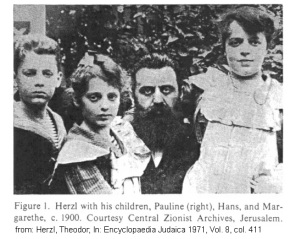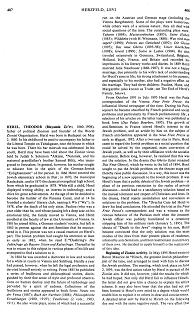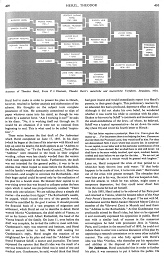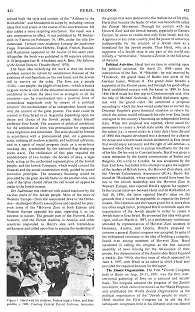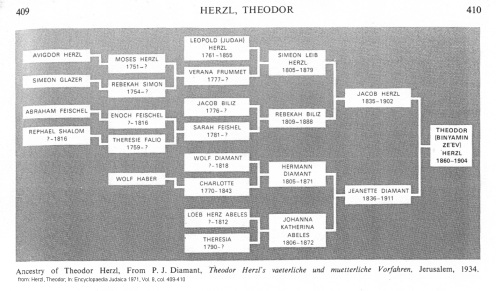Encyclopaedia Judaica
Theodor Herzl 01: The way to Fantasy Zionism
Schools and student times - doctorate - Paris and the Dreyfus case - Moses Fantasy Jewish state plans - searching for support - Herzl does not see the trap of Muhammad Fantasy Arab anti-Semitism
Encyclopaedia Judaica 1971: Theodor Herzl, vol. 8, col. 411: Herzl with children Hans, Margarethe, and Pauline
from: Herzl, Theodor; In: Encyclopaedia Judaica 1971, vol. 8
presented by Michael Palomino (2008 / 2019 / 2023)
3 fantasies - but Mother Earth is REAL
Moses is a fantasy - nothing could be found of him. The proofs are in the book: The Bible unearthed - link. So, Jewry is a fantasy, and also the Jewish calendar is a fantasy. Also Jesus is a fantasy: nothing could be found, but it's a code fantasy with the numbers 3,12,13 and 33 - link. Therefore, Christiandom is a fantasy, and also the Christian calendar is a fantasy - and the Vatican is a criminal pedophile satanic drug money laundering bank mafia - link with videos - link with news. Also Muhammad is a fantasy: nothing could be found, and the name "Muhammad" was used only since 850, not in 600 - link. Therefore also the Muslim calendar is a fantasy. Peace and healings and instructions how to handle the planet are with Mother Earth - Mother Earth is REAL and everybody can learn it: http://www.med-etc.com - have a good day. - Michael Palomino, May 12, 2019
| Teilen
/ share: |
Facebook |
|
Twitter
|
<HERZL, THEODOR (Binyamin Ze'ev; 1860-1904),
father of political [[Fantasy]] Zionism and founder of the World [[Moses Fantasy]] Zionist Organization. Herzl was born in Budapest on May 2, 1860. In his childhood he used to accompany his father to the Liberal Temple on Tabakgasse [["Tobacco alley"]], near the house in which he was born. There his bar mitzvah [[13 years festivity]] was celebrated. In his youth, Herzl may have been told about the [[Moses Fantasy]] Zionist views held by Judah b. Solomon *Alkalai, *Natonek, and his maternal grandfather's brother Samuel Bilitz, who immigrated to Jerusalem. In general, however, his mother sought to educate him in the spirit of the German-Jewish "Enlightenment" of the period.
[Schools and student times - confrontation with German student anti-Semitism and Duehring]
In 1866 Herzl entered the [[Moses Fantasy]] Jewish elementary school in Pest; in 1870, the municipal Realschule; and in 1875 the classical evangelical high school, from which he graduated in 1878. While still a child, Herzl displayed writing ability, an interest in technology, and a drive for great achievements. At the age of ten he decided to become the builder of the Panama Canal, and at 14 he founded a students' literary club, naming it Wir ("We").
In 1878, after the death of his only sister, Pauline (who was a year older than he, and whose passing left a deep scar on his emotional life), the family moved to Vienna, and Herzl enrolled at the faculty of law at the University of Vienna. In 1881 he joined Albia, a German students' society, but left in 1883 in protest against the anti-Semitism that he encountered in it. This protest was not a casual reaction on Herzl's part.
The [[Moses Fantasy]] Jewish problem had caught his attention at least as early as 1882, when he read E. *Duehring's Die Judenfrage als Rassen- Sitten und Kulturfrage [["The Jewish question as a question of race, custom and culture"]]. Thereafter he was to return to this subject in various phases of his life and attempted to find a solution to it.
[Doctorate in law - writing work with feuilletons, philosophical stories, and plays]
In 1884 he was awarded a doctorate in law and worked for a while in courts in Vienna and Salzburg. Hardly a year had passed, however, when he left the legal profession and devoted himself entirely to writing. From 185 he published a series of feuilletons and philosophical stories, distinguished by their fine sense of style and profound observations on human destiny and the future of technology and pervaded by a spirit of sadness. Collections of the feuilletons and stories appeared in book form: Neues von der Venus [["News form Venus"]] (1887); Buch der Narrheit [["Book of madness"]] (1888); Philosophische Erzaehlungen [["Philosophic tales"]] (1900, 1919); Feuilletons (2 vols.; 1903, 1911).
He also wrote plays, some of which had a successful (col. 407)
run on the Austrian and German stage (including the Vienna Burgtheater). Some of the plays were humorous, while others were of a serious nature; they all deal with social questions of the time. The outstanding plays were: Tabarin (1884); Muttersoehnchen [["Mummy's darling"]] (1885); Seine Hoheit [["Your Majesty"]] (1885); Wilddiebe [["Deer thieves"]] (with H. Wittmann, 1888); Was wird man sagen? [["What will be said?"]] (1890); Prinzen aus Genieland [["Princes from the country of the genius"]] (1892); Die Glosse [["Commentary"]] (1895); Das neue Ghetto [["The new ghetto"]] (1895-98); Unser Kaethchen [["Our Caty"]] (1898); Gretel (1899); Solon in Lydien [["Solon in Lydia"]] (1904).
He also traveled extensively in Germany, Switzerland, Belgium, Holland, Italy, France, and Britain and recorded his impressions in his literary works and diaries.
[Marriage and three children]
In 1889 Herzl married Julia Naschauer (1868-1907). It was not a happy marriage, due primarily to his wife's lack of understanding for Herzl's aims in life; his strong attachment to his parents, and especially to his mother, also had a negative effect on the marriage. They had three children: Pauline, Hans, and Margarethe (also known as Trude; see The End of Herzl's Family, below).
[1891-1895: Herzl as correspondent in Paris - play "The Ghetto" and discussion about anti-Semitism]
From October 1891 to July 1895 Herzl was the Paris correspondent of the Vienna Neue Freie Presse [["New Free Press"]], the influential liberal newspaper of the time. During his Paris sojourn he became absorbed by French parliamentary life; a selection of his articles on the latter topic was published in book form (Das Palais Bourbon, [["The Bourbon Palace"]], 1895). the growth of anti-Semitism in France stirred Herzl's interest in the [[Moses Fantasy]] Jewish problem, and an article by him on the subject of French anti-Semites appeared in the Neue Freie Presse as early as August, 1892.
After a two-year stay in Paris, Herzl came to regard the [[Moses Fantasy]] Jewish problem as a social question that could be solved by the organized, mass conversion of [[Moses Fantasy]] Jewish youth, as well as by their affiliation with the socialist movement. Before long, however, he realized that this was not the solution.
In the drama Das Ghetto [["The Ghetto"]] (later renamed Das Neue Ghetto [["The New Ghetto"]], which he wrote in the fall of 1894, Herzl sought to put the [[Moses Fantasy]] Jewish problem on the theater stage and thereby raise public discussion. In a way, this move was the beginning of a new approach to the [[Moses Fantasy]] Jewish problem. It was Herzl's hope that a public debate of the [[Moses Fantasy]] Jewish problem - in place of its previous restriction to the realm of private discussion - would lead to a satisfactory solution based on the mutual tolerance and respect of [[Jesus Fantasy]] Christians and [[Moses Fantasy]] Jews. In the drama, Herzl rejects assimilation and conversion as solutions to the problem.
[[Well, it seems Herzl forgot to speak with the Jesus Fantasy Church authorities who are the basic cause of anti-Semitism with the Bible and the Judas case which - according to the latest research - is not at all true]].
[1895: The Dreyfus Case leads Herzl to radical ideas of a new territory for the [[Moses Fantasy]] Jews]
The *Dreyfus Case led Herzl to draw his final conclusions. He attended the trial as the Neue Freie Presse's correspondent and and was a witness to the riotous behavior of the Parisian mob when the innocent [[Moses Fantasy]] Jewish officer was publicly humiliated in a ceremony stripping him of his military rank (January 5, 1895). the shouts of "Death to the [[Moses Fantasy]] Jews" ringing in his ears, Herzl became convinced that the only solution was the mass exodus of the [[Moses Fantasy]] Jews from their present places of residence, infested by anti-Semitism, and their resettlement in a territory of their own. He decided to apply himself to the realization of this idea.
[[Herzl made another big fault: He never was in other countries to have another look to the situation which was not bad everywhere. An the third fault of Herzl is that he is not considering the new anti-Semitism wave where the Jewish masses should settle. That's why many Jewish leaders may have objected to this Herzl fantasy which never considers the Muhammad Fantasy Arabs and the Muhammad Fantasy Palestinians]].
Beginning of [[Moses Fantasy]] Zionist Activity.
[Baron Maurice de Hirsch objects to the Herzl Moses Fantasy Zionist plan]
In May 1895 Herzl wrote to Baron Maurice de *Hirsch, the greatest [[Moses Fantasy]] Jewish philanthropist of the time, and arranged to meet with him to discuss the [[Moses Fantasy]] Jewish problem. The meeting, which took place on June 2, 1895, was the first action taken by Herzl in pursuit of the [[Moses Fantasy]] Zionist aim. It did not, however, yield the results for which he had hoped. Not only did Herzl fail to influence Hirsch; the latter did not give him a chance to explain his entire scheme. It may also have been that the plan had not yet been formed in Herzl's own mind to a degree which would enable him to explain it to others in clear and concise terms.
A detailed letter sent by Herzl to Hirsch on the following day met with the same negative result. The very effort that (col. 408)
[Herzl working out his [[Moses Fantasy]] Zionist plan - "The Jewish State" of 17 June 1895]
Herzl had to make in order to present his plan to Hirsch, however, resulted in further analysis and elaboration of the scheme. His thoughts on the subject took complete possession of him. He constantly committed to slips of paper whatever came into his mind, as though he was driven by a superior force. "Am I working it out?" he asks in his diary. "No, it is working itself out through me. It would be an obsession if it were not so rational from beginning to end. This is what used to be called 'inspiration'."
These notes became the first draft of Der Judenstaat [["The Jewish State"]] which Herzl completed on June 17, 1895.
[[Supplement: The Herzl plan is to drive the Muhammad Fantasy Arabs away as the natives of the Jesus Fantasy "USA" had been driven away. There are no borderline definitions. Moses Fantasy Zionists are dreaming of a "Greater Israel" with the Euphrates as the border according to First (Fantasy) Mose chapter 15 phrase 18]].
In his diary (which he began at the time of his interview with Hirsch and kept up until his death), the draft appears as an "Address to the Rothschilds", or "To the Family Council". Parts of the "Address" were retained in the book in their original wording; others were less clearly worded than the version which later appeared in the book. Furthermore, the draft was not intended for the general public; it was to be an address that Herzl hoped to make before the Rothschilds, and the family's wealth played a central role in it.
[Herzl hopes for support by the Rothschild family]
Herzl was convinced - and sought to convince the Rothschilds - that their huge capital could be saved only by the realization of his plan for a [[Moses Fantasy]] Jewish state. He likened their capital to an ever-rising tower that was bound to collapse unless the base upon which it rested was proportionately widened. "There exists only one solution: We are talking about a simple old matter - the exodus from Egypt." The Rothschild's wealth, he argued, which roused the envy of the gentile world, should be sanctified by the goal it serves. It should provide the financial basis of a vast program of migration and settlement, which Herzl set out to describe in detail.
[Herzl hopes for coordination between Albert Rothschild and chief rabbi Moritz Guedemann - Schiff names the Herzl [[Fantasy]] Zionism a "nervous breakdown" and Herzl would be "insane" - Herzl's fourth letter to Hirsch]
Herzl wanted Moritz *Guedemann, the chief rabbi of Vienna, to act as his liaison with Albert Rothschild, the head of the Vienna branch of the family. On June 11, even before the draft was complete, he invited the rabbi to meet with him. Guedemann's reply was reserved and hesitant, and Herzl sent a second letter to him.
While still waiting for Guedemann's reply, Herzl sought the reaction of an enlightened [[Moses Fantasy]] Jew to his plan and read the "Address" to his friend Friedrich Schiff, a doctor and journalist. The latter expressed the opinion that Herzl's idea was the result of a nervous breakdown and that Herzl was in need of rest and medical care. Guedemann, he said, would think that Herzl (col. 409)
had gone insane and would immediately report it to Herzl's parents, to their great chagrin.
This preliminary reaction by an educated [[Moses Fantasy]] Jew had a profound, depressive effect on Herzl. Although it did not shake his own belief, he wondered whether it was worth his while to continue with his plan. Shaken to his roots by Schiff's comments and incensed over the small-mindedness of the [[Moses Fantasy]] Jews - of whom, he believed, Schiff was a typical representative - he sat down the same day (June 18) and wrote his fourth letter to Hirsch:
"My last letter requires a postscript. Here it is: I have given the matter up ... For the present there is no helping the [[Moses Fantasy]] Jews. If someone showed them the Promised Land, they would scoff at him. For they are demoralized. Still, I know where that country lies: in ourselves! In our capital, in our labor and in the particular combination of the two which I have devised. But we shall have to sink still lower; we shall have to be more widely insulted, splat upon, mocked, beaten, robbed and slain before we are ripe for the idea ... We are not yet desperate enough, so a rescuer would be greeted with laughter."
Later on, Herzl compared the crisis of that period to a white-hot body thrown into cold water: "If that body happens to be made of iron, it turns into steel." Herzl came out of the crisis with greater strength. The obstacles that were later put in his way, the scorn that was heaped on him, and the attacks to which he was subject, might cause a temporary depression; but they could never divert him from the course he had set himself.
[[Muhammad Fantasy Palestinians and Muhammad Fantasy Arabs living in the "Promised (Fantasy) Land" are not mentioned, and the "Promised (Fantasy) Land" is not only for the Moses Fantasy Jews. So a Moses Fantasy Jewish invasion will automatically be countered by harsh Muhammad Fantasy Arab anti-Semitism. The non-Zionists see these problems and are strictly against the Moses Herzl fantasy, but the blind Mr. Herzl is not giving up, and never speaks with the Jesus Fantasy Church representatives who give the base for any anti-Semitism...]]
[since July 1895: Herzl in Vienna - talks about Herzl [[Fantasy]] Zionism - only Nordau can be won for it]
In July 1895, Herzl asked to be relieved of his Paris post and returned to Vienna, where he became editor of the Neue Freie Presse's literary section. On August 17 he met with M. Guedemann and the Berlin banker Heinrich Meyer Cohn (a member of the *Hovevei Zion) in Munich and read them his "Address to the Rothschilds". At first Guedemann was profoundly stirred by Herzl's idea, but later on he opposed it and eventually expressed his opposition in public. Herzl met with a similar lack of success in the numerous conversations he held with prominent [[Moses Fantasy]] Jews in Vienna, Paris, and London in the second half of 1895; he could not induce them to enter into a serious discussion of his plan by appointing a research commission or in some other suitable manner. The only one who fully agreed with Herzl's idea was Max *Nordau, who thereafter put his reputation and abilities at the disposal of Herzl and [[Fantasy]] Zionism.
Der Judenstaat [["The Jewish State", second edition 1896]].
Herzl concluded that in order to further his plan, it was necessary to put it before the public. He (col. 410)
revised both the style and content of the "Address to the Rothschilds" and broadened its scope by including various ideas that had arisen in the course of his conversations. He also added a more inspiring conclusion. The result was a new composition in effect. It was published by M. Breitenstein in Vienna on February 14, 1896, under the title Der Judenstaat. Versuch einer modernen Loesung der juedischen Frage. [["The Jewish State. Trial of a modern solution of the Jewish question"]].
Translations into Hebrew, English, French, Russian, and Rumanian [[Romanian]] appeared in the course of the same year. Altogether the book was published in 80 separate editions in 18 languages (see H. Abrahami and A. Bein, The Editions of the Jewish State by Theodor Herzl, 1970).
The basic idea underlying the work is that the [[Moses Fantasy]] Jewish problem cannot be solved by assimilation because of the existence of anti-Semitism on the one hand, and the [[Moses Fantasy]] Jewish will to survive on the other.
[[The Jesus Fantasy Church as the main cause of anti-Semitism with the Judas case is never mentioned by Herzl neither by the Encyclopaedia Judaica]].
The [[Moses Fantasy]] Jews are a people (Volk) - one people;
[[Also this is wrong: Jews are a religion, not a people]].
the plight of the Jews - which is bound to grow worse in view of the abnormal economic and social conditions in which the [[Moses Fantasy]] Jews live as strangers in all the countries - can be transformed into a positive force of tremendous magnitude only by means of a political solution: the establishment of an independent [[Moses Fantasy]] Jewish state with the consent of the great powers.
[[Muhammad Fantasy Arabs and Muhammad Fantasy Palestinians are not mentioned because at this time they have no weapons. The don't count!]].
The state could be created in Erez Israel [[Fantasy Land of Israel]] or in Argentina depending upon the desire and choice of the [[Moses Fantasy]] Jewish people. Herzl himself preferred Erez Israel. The creation of political conditions for the settlement of [[Moses Fantasy]] Jews was prerequisite for organized mass migration and settlement. The state would be formed in accordance with a preconceived plan, on a generous scale, utilizing all modern scientific and technical advances, and in a spirit of social progress (such as a seven-hour working day, symbolized by the national flag displaying seven stars).
[[With the "technical advance" the Muhammad Fantasy Arabs should be easily driven away as the natives in the Jesus Fantasy "USA" had been driven away. So the land should be taken easily]].
The realization of this plan required the establishment of two bodies: the Society of [[Moses Fantasy]] Jews, a legal body acting as the authorized representative of the [[Moses Fantasy]] Jewish people, and the [[Moses Fantasy]] Jewish Company, which would control the finances and the actual construction work, guided by sound economic principles. The necessary financing would be provided by the great [[Moses Fantasy]] Jewish banks or the smaller ones, and only if the latter should refuse the call would an appeal be made to the [[Moses Fantasy]] Jewish masses.
[Mixed reactions on the book "The Jewish State"]
Der Judenstaat was received with mixed reactions by the various parts of the [[Moses Fantasy]] Jewish people. Most of the [[Moses Fantasy]] Jews of Western Europe - from the assimilated [[Moses Fantasy]] Jews to the Orthodox - challenged Herzl's assumptions and rejected his plan; even some of the *Hovevei Zion in both Eastern and Western Europe opposed his plan, regarding it as too extreme in nature. The greater part of the Hovevei Zion, however, and the [[Moses Fantasy]] Zionist students in Austria and other countries responded to Herzl's idea with tremendous enthusiasm and called upon him to assume the leadership of (col. 411)
the groups that were dedicated to the realization of his plan.
Herzl thus became the leader of what was henceforth called the [[Moses Fantasy]] Zionist Movement. Through his contact with the Hovevei Zion and the [[Moses Fantasy]] Jewish masses, especially in Eastern Europe, he came to realize that only Erez Israel, and not Argentina or any other country, had the power of attraction indispensable for the creation of a [[Moses Fantasy]] Jewish state as a homeland for the [[Moses Fantasy]] Jewish people. Thus Herzl, who as a supporter of a [[Moses Fantasy]] Jewish state in any part of the world was initially a "territorialist", became a [[Moses Fantasy]] Zionist in the full sense of the term.> (col. 412)
[[They all don't see the main cause of anti-Semitism: the Jesus Fantasy Church; and they all don't see the future: harsh Arab anti-Semitism with Muhammad Fantasy and an eternal war. So, the Moses Fantasy Zionist Herzl plan is leading the Moses Fantasy Jews from European Jesus Fantasy anti-Semitism into Arab Muhammad Fantasy anti-Semitism. The Herzl plan is a trap. It's strange that Herzl with his doctorate does not see this. The non-Zionists see the trap and resign completely to the plan]].
| Teilen
/ share: |
Facebook |
|
Twitter |



